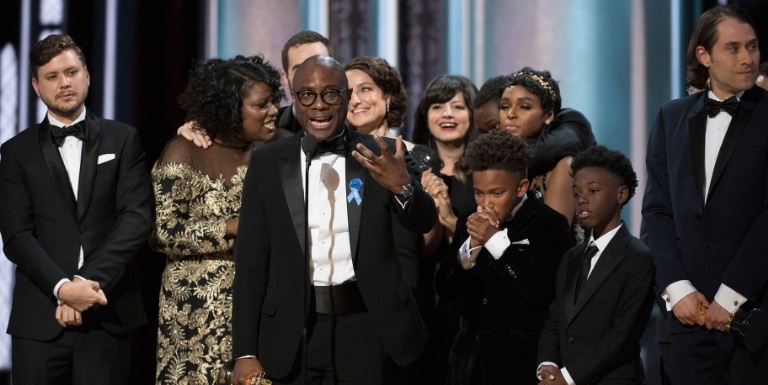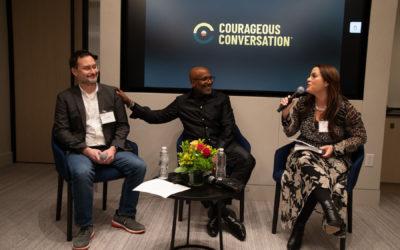By Brittney Cooper—Feb. 27, 2017
The Academy Awards did the best possible thing in the worst possible way last night, when it conferred Moonlight the Oscar for Best Picture. This exquisite coming-of-age tale about a black boy struggling to embrace queer masculinity deserved all the shine it got this year, including three trophies last night. But Academy officials sullied Moonlight’s moment in the sun by initially giving the award to the wrong film, La La Land. It remains unclear how the award’s announcers, Warren Beatty and Faye Dunaway, ended up with a duplicate copy of the card for Best Actress in a Leading Role, an award which went to Emma Stone. But in the middle of the La La Land team giving their round of acceptance speeches, they were told that the award had actually gone to Moonlight, and that team was then invited on stage as an afterthought. In the shuffle, host Jimmy Kimmel tried to assuage the clear disappointment of the La La Land’ers saying, “I think you guys should keep it anyway.” That’s not how this works, Jimmy Kimmel. That’s not how any of this works!
It is both entirely obvious and absolutely necessary to say that this incident is an apt metaphor for thinking about the politics of race and diversity in America. It has taken multiple decades of struggle to even arrive at a universe where a movie with the emotional and artistic complexity of Moonlight, a movie that puts black characters and communities at its center, would have a shot at multiple Oscars. Then it won the evening’s biggest prize of all, but only after being told it lost. And then the film’s creators had to share the stage with La La Land. The moment was unfortunate for everyone involved, but it was most unfortunate for Moonlight.
Throughout the night, we heard several overtures about the importance of diversity. Cheryl Boone Isaacs, a black woman and President of the Academy, talked about the work being done to make the Hollywood community more inclusive. Asghar Farhadi, an Iranian filmmaker, who won for Best Foreign Language film, stayed home in protest of Trump’s Muslim ban. And when Gael García Bernal came on stage to present an award, he said, “As a Mexican, as a Latin American, as a migrant worker, as a human being, I’m against any form of walls that wants to separate us.” During the final award mix-up, La La Land producer Jordan Horowitz said the arts community should “create and champion bold and diverse work.” A few moments later, he handed the statue he’d been holding to a member of the Moonlight team.
This debacle brought into stark relief just exactly how messy it is and will continue to be to make traditionally white institutions more diverse and inclusive. In many cases, it will look like black people coming on stage to take away the very awards that white people presumed they would win and prepared themselves to receive. This is the scary part of what it means for white people to challenge white privilege: it means sometimes they will lose. More than that, it means they will have to endure the humiliation of losing when they were so entirely sure they had won.
Part of what it requires to do the work of diversity is to recognize that there are some moments you simply cannot mess up. This was one of those moments. Although PricewaterhouseCoopers, the accounting firm that oversees the tabulation of Oscars ballots, has taken responsibility for the mix-up, imagine how it feels to the talent of Moonlight to not have had the fullness of their moment. Imagine how the mistake feels to those of us who have rarely seen ourselves represented in the awards ceremony. The carelessness and haphazardness with which Moonlight’s moment was treated is indicative of how institutional racism continues to work, even after people of color have overcome a significant barrier.
Institutional racism is often hard to see because we can’t point to an individual person who had bad intentions. Thus we are often taught to think that structural discrimination isn’t real. But institutional racism isn’t about a single actor or intent; it’s about impact. Sunday night’s comedy of errors is only laughable because it’s an awards show. In the lives of everyday black people, this kind of carelessness shows up when a supervisor fails to celebrate the promotion of a black employee, while the promotion of a white counterpart is the subject of copious congratulation — it may have been an honest oversight, but the impact is harmful.
Read more at Cosmopolitan.




